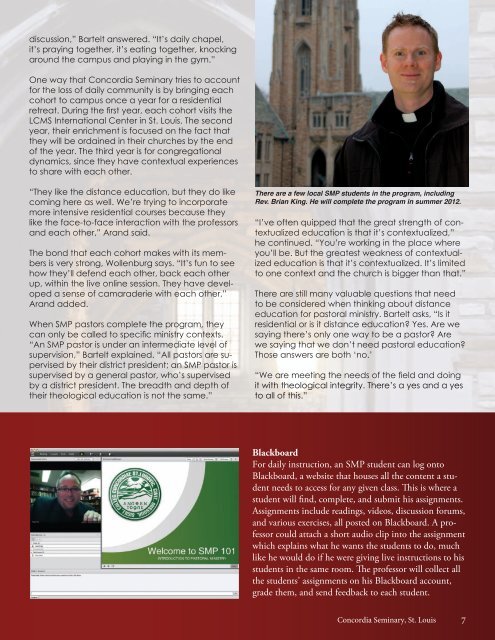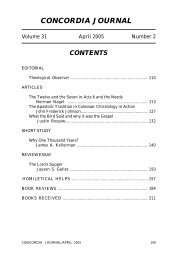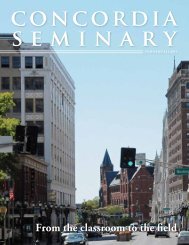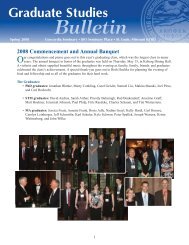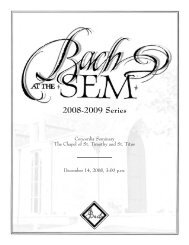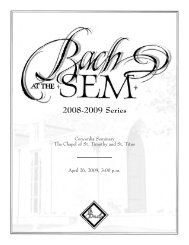Concordia Seminary magazine | Winter 2012
Concordia Seminary magazine | Winter 2012
Concordia Seminary magazine | Winter 2012
You also want an ePaper? Increase the reach of your titles
YUMPU automatically turns print PDFs into web optimized ePapers that Google loves.
discussion,” Bartelt answered. “It’s daily chapel,<br />
it’s praying together, it’s eating together, knocking<br />
around the campus and playing in the gym.”<br />
One way that <strong>Concordia</strong> <strong>Seminary</strong> tries to account<br />
for the loss of daily community is by bringing each<br />
cohort to campus once a year for a residential<br />
retreat. During the first year, each cohort visits the<br />
LCMS International Center in St. Louis. The second<br />
year, their enrichment is focused on the fact that<br />
they will be ordained in their churches by the end<br />
of the year. The third year is for congregational<br />
dynamics, since they have contextual experiences<br />
to share with each other.<br />
“They like the distance education, but they do like<br />
coming here as well. We’re trying to incorporate<br />
more intensive residential courses because they<br />
like the face-to-face interaction with the professors<br />
and each other,” Arand said.<br />
The bond that each cohort makes with its members<br />
is very strong, Wollenburg says. “It’s fun to see<br />
how they’ll defend each other, back each other<br />
up, within the live online session. They have developed<br />
a sense of camaraderie with each other,”<br />
Arand added.<br />
When SMP pastors complete the program, they<br />
can only be called to specific ministry contexts.<br />
“An SMP pastor is under an intermediate level of<br />
supervision,” Bartelt explained. “All pastors are supervised<br />
by their district president; an SMP pastor is<br />
supervised by a general pastor, who’s supervised<br />
by a district president. The breadth and depth of<br />
their theological education is not the same.”<br />
There are a few local SMP students in the program, including<br />
Rev. Brian King. He will complete the program in summer <strong>2012</strong>.<br />
“I’ve often quipped that the great strength of contextualized<br />
education is that it’s contextualized,”<br />
he continued. “You’re working in the place where<br />
you’ll be. But the greatest weakness of contextualized<br />
education is that it’s contextualized. It’s limited<br />
to one context and the church is bigger than that.”<br />
There are still many valuable questions that need<br />
to be considered when thinking about distance<br />
education for pastoral ministry. Bartelt asks, “Is it<br />
residential or is it distance education? Yes. Are we<br />
saying there’s only one way to be a pastor? Are<br />
we saying that we don’t need pastoral education?<br />
Those answers are both ‘no.’<br />
“We are meeting the needs of the field and doing<br />
it with theological integrity. There’s a yes and a yes<br />
to all of this.”<br />
Blackboard<br />
For daily instruction, an SMP student can log onto<br />
Blackboard, a website that houses all the content a student<br />
needs to access for any given class. This is where a<br />
student will find, complete, and submit his assignments.<br />
Assignments include readings, videos, discussion forums,<br />
and various exercises, all posted on Blackboard. A professor<br />
could attach a short audio clip into the assignment<br />
which explains what he wants the students to do, much<br />
like he would do if he were giving live instructions to his<br />
students in the same room. The professor will collect all<br />
the students’ assignments on his Blackboard account,<br />
grade them, and send feedback to each student.<br />
<strong>Concordia</strong> <strong>Seminary</strong>, St. Louis<br />
7


